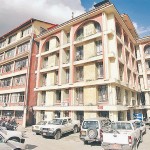NEPAL > Unbundling of Nepal Electricity Authority (NEA) starts
 KATHMANDU, Feb 23: The government has started unbundling of the Nepal Electricity Authority (NEA) deeming that development of energy sector suffered while generation, transmission and distribution/sale of electricity were handled through a single body.
KATHMANDU, Feb 23: The government has started unbundling of the Nepal Electricity Authority (NEA) deeming that development of energy sector suffered while generation, transmission and distribution/sale of electricity were handled through a single body.
The Energy Ministry has started process to form Grid Development Company by separating transmission from the NEA in the first stage. The ministry has also started homework for Public Generation Company by separating generation from the NEA. The Grid Development Company Limited, fully owned by the government, will be established within this week. The NEA will only have distribution department with it after separate companies are formed for generation and transmission. Similarly, Power Trading Company will also be formed for procuring and selling electricity.
The NEA had informally started the unbundling process by forming subsidiary companies for constructing Chilime, Upper Tamakoshi, Rasuwagadi and other projects. “Unbundling process has been started to separate transmission and generation from the NEA. We have written to the Finance Ministry to provide Rs 7.50 million to register the National Grid Company. The company will be established within this week after the amount is released. We will then start the process of separating generation department,” Energy Secretary Rajendra Kishore Chhetri says.
The transmission company will charge wheeling fee for transmitting electricity generated by different projects. The wheeling charge has yet to be determined. The cabinet has already approved promoter shareholders—including forest and soil conservation, science, technology and environment, land reform and management and information and communication ministries—for the company. “There have been recurring problems in expansion of transmission line due to obstruction by forest and soil conservation, and science, technology and environment ministries. The problems faced in expansion of transmission line will be automatically solved if the ministries concerned were to become shareholders in the company,” he reasons.
All the transmission infrastructure and staffers under the NEA will be transferred to the National Grid Company once the company comes into existence. “The unbundling process has been adopted deeming that handling of generation, transmission and distribution/sale of electricity through a single body was not effective. This will be addressed through the act,” he adds. He reveals that the government has already started the process of amending Electricity Act. A National Electricity Regulatory Commission will also be formed to regulate the energy sector. Valuation of transmission infrastructure developed by the NEA will also be done.
He says Budi Gandaki, Nalsinggad and other big projects will be developed through the Public Generation Company. The NEA is currently doing feasibility study for half a dozen big reservoir-based projects. Revealing that the cabinet had decided four years ago to form a separate grid company, he adds, “The process had not moved forward then after moving the work of connecting transmission line to distribution. The work will now start by formally registering the company.”
The National Water Resource Study also talks about unbundling of the NEA. The World Bank (WB) and the Asian Development Bank (ADB) had also been advising unbundling stating that handling of generation, transmission and distribution/sale of electricity through a single body was not effective. The employee unions at the NEA had been opposing the unbundling process but they are now silent about the issue.
Projects being constructed in Solu, Koshi, Kaveli, Marsyangdi, Kali Gandaki, Trishuli and other corridors with private investment have been affected with the NEA failing to effectively expand transmission line. The NEA faces risks of having to pay billions to promoters in compensation if it were to fail to construct transmission line in time but the promoters were to complete the projects in scheduled time.
Source: Karobar




